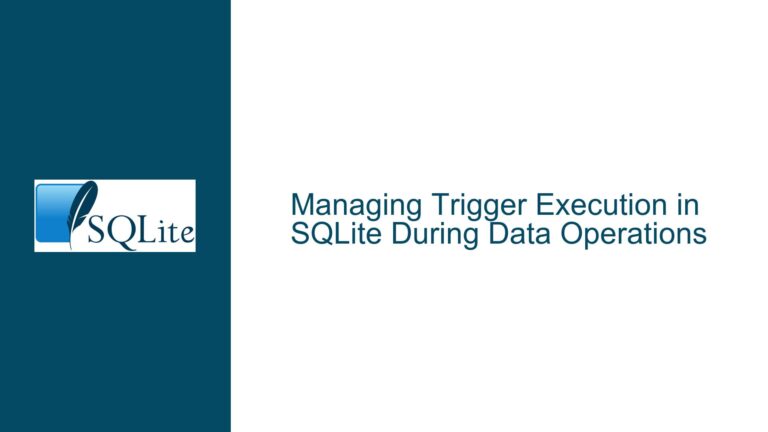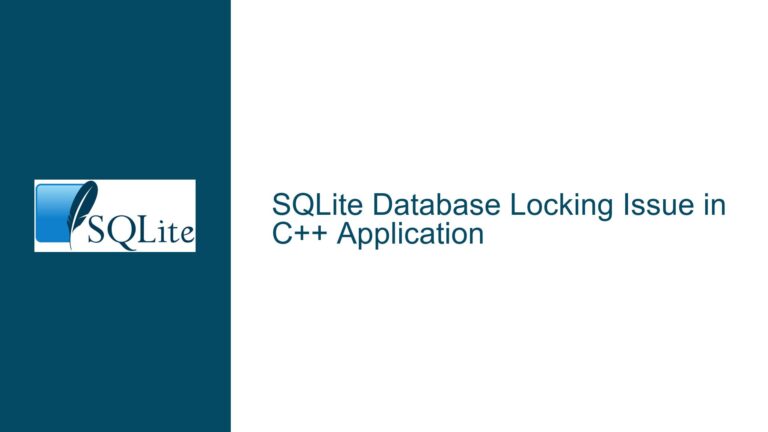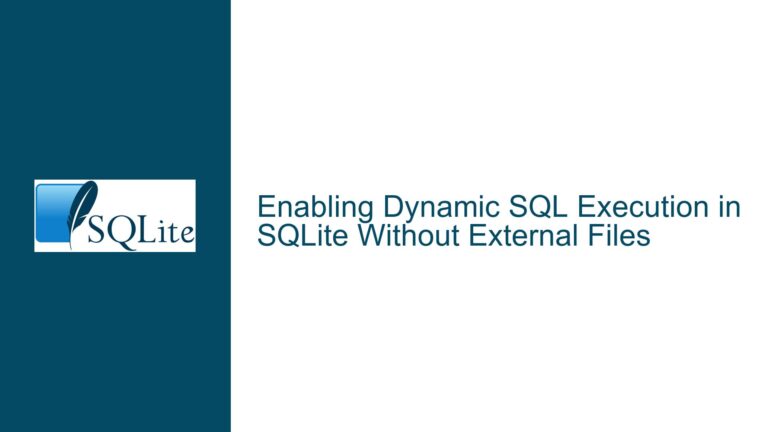and Resolving Delayed SQLite Query Execution in PHP with Lighttpd
SQLite Query Execution Delay in PHP with Lighttpd
When working with SQLite databases in a PHP environment, particularly under the Lighttpd web server, developers may encounter unexpected delays in query execution when multiple clients attempt to access the database simultaneously. This issue can manifest as a noticeable lag, where the second client’s request is delayed until the first client’s request is fully processed. Understanding the root cause of this behavior and implementing effective solutions is crucial for optimizing database performance and ensuring a smooth user experience.
Lighttpd Single-Threaded Nature and SQLite Locking Mechanism
The core of the issue lies in the interaction between the Lighttpd web server’s single-threaded nature and SQLite’s locking mechanism. Lighttpd, while efficient and lightweight, processes requests in a single-threaded manner by default. This means that it can only handle one request at a time, leading to a sequential processing of client requests. When a PHP script executes a SQLite query, it acquires a lock on the database to ensure data integrity during read and write operations. SQLite employs a file-based locking mechanism, which can cause subsequent queries to wait until the lock is released.
In the context of the provided scenario, the first client’s request acquires a lock on the SQLite database, executes the query, and then enters a sleep state. During this period, the second client’s request is queued and must wait for the lock to be released before it can proceed. This results in the observed delay, where the second page appears only after the first page’s processing is complete.
Implementing PRAGMA journal_mode and Optimizing PHP Code
To address the delay in SQLite query execution, developers can implement several strategies that focus on optimizing both the SQLite database configuration and the PHP code. One effective approach is to modify the SQLite journal mode using the PRAGMA statement. The journal mode determines how SQLite handles transactions and can significantly impact performance. By setting the journal mode to WAL (Write-Ahead Logging), SQLite allows multiple readers to access the database simultaneously while ensuring data consistency. This can reduce contention and improve query response times.
In addition to adjusting the journal mode, developers should ensure that PHP resources are properly managed. This includes finalizing SQLite statements and closing database connections promptly after use. Finalizing a statement releases any locks held by the query, allowing subsequent requests to proceed without delay. In the provided PHP code, the $result object should be finalized before entering the sleep state. This can be achieved by calling the finalize method on the SQLite3Result object.
Furthermore, developers should consider optimizing their PHP code to minimize the time spent holding database locks. This can involve reducing the complexity of queries, using indexed columns for faster data retrieval, and avoiding long-running transactions. By streamlining the code and ensuring efficient resource management, developers can mitigate the impact of Lighttpd’s single-threaded nature on SQLite query execution.
Detailed Troubleshooting Steps and Solutions
To systematically address the issue of delayed SQLite query execution in PHP with Lighttpd, follow these detailed troubleshooting steps and implement the corresponding solutions:
Modify SQLite Journal Mode: Begin by setting the SQLite journal mode to
WALusing the PRAGMA statement. This can be done by executing the following command in your PHP script:$db->exec("PRAGMA journal_mode=WAL;");The
WALmode allows concurrent read operations, reducing the likelihood of delays caused by locking.Finalize SQLite Statements: Ensure that all SQLite statements are finalized promptly after use. In the provided PHP code, add the following line before the sleep statement:
$result->finalize();This releases any locks held by the query, allowing subsequent requests to proceed without waiting.
Optimize PHP Code: Review and optimize your PHP code to minimize the time spent holding database locks. This includes simplifying complex queries, using indexed columns, and avoiding long-running transactions. For example, if your query involves multiple joins or subqueries, consider breaking it down into smaller, more efficient queries.
Monitor and Analyze Performance: Use tools such as SQLite’s
EXPLAIN QUERY PLANto analyze the performance of your queries. This can help identify bottlenecks and areas for improvement. Additionally, monitor the Lighttpd server logs to identify any patterns or anomalies in request processing times.Consider Alternative Web Servers: If the delay persists and is unacceptable for your application, consider using a multi-threaded web server such as Apache or Nginx. These servers can handle multiple requests simultaneously, reducing the impact of SQLite’s locking mechanism on query execution times.
By following these steps and implementing the recommended solutions, developers can effectively address the issue of delayed SQLite query execution in PHP with Lighttpd. This will result in improved database performance, reduced latency, and a better overall user experience.
Conclusion
The delay in SQLite query execution observed in PHP with Lighttpd is primarily due to the single-threaded nature of Lighttpd and SQLite’s locking mechanism. By understanding the underlying causes and implementing strategies such as modifying the SQLite journal mode, finalizing statements, and optimizing PHP code, developers can mitigate this issue and enhance database performance. Additionally, monitoring and analyzing performance, as well as considering alternative web servers, can further contribute to a more efficient and responsive application. Through careful troubleshooting and optimization, developers can ensure that their SQLite databases perform optimally in a PHP environment, even under the constraints of a single-threaded web server like Lighttpd.






